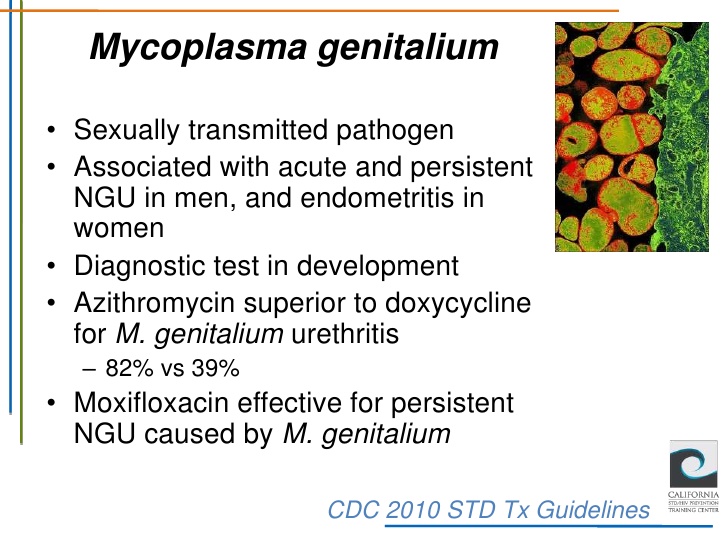Mycoplasma genitalium also known as Mgen, is a sexually transmitted, small, and pathogenic bacterium that lives on the ciliated epithelial cells of the urinary and genital tracts in humans. Mgen was only recently recognized as a sexually transmitted infection after a study conducted by British Scientists uncovered its links to some sexual conditions. The bacteria which lives on the ciliated epithelial cells of the urinary and genital tracts in humans has been identified as a co-factor in the transmission of the Human Immuno Deficiency virus HIV the causative agent of AIDS.
Mgen is responsible for many conditions including cervicitis and pelvic inflammation in women and urethritis in both men and women. With a genome sequence of 0.58 Mbp and 475 genes, this organism was regarded as a cellular unit with the smallest genome size (in Mbp) until recently when an even smaller unit was discovered.
According to the Centers for Disease Control (CDC), Mycoplasma Genitalium is more common than gonorrhea in the United States. The disease also affects around 250,000 people aged 16-44 in the United Kingdom representing 1 percent of the population according to UK census data.
Signs and symptoms
Men
In men, Mgen infection causes urethritis (infection of the urethra, the urinary canal leading from the bladder to exit at the tip of the penis). Symptoms of this condition may include:
- Watery discharge from the penis
- Burning sensation in the penis when urinating.
Women
In women, Mgen infection causes infection of the cervix (opening of the uterus (womb) at the top of the vagina). Symptoms are usually absent but may include:
- Abnormal discharge from the vagina
- Discomfort on urination
- Bleeding between periods, often after sex.
Without proper treatment, infection of the cervix may spread to the Fallopian tubes (tubes leading from the ovary to the uterus) and cause pelvic inflammatory disease (PID). This may be without symptoms, but there may be:
- Fever
- Low abdominal pain
- Pain on intercourse.
If untreated, PID may lead to scarring of the Fallopian tubes and ectopic or tubal pregnancy (in the Fallopian tubes) or eventual infertility. Generally, the signs and symptoms of Mgen in both men and women can include:
Diagnosis Of Mgen
Polymerase chain reaction (PCR) test in a pathology laboratory on urine or a sample of discharge from the cervix or urethra. However, a PCR test for Mgen is not readily available and many infections in men will be labeled as non-specific urethritis. The diagnosis is usually made when symptoms are present and tests for gonorrhea and chlamydia are negative and further testing for M. genitalium is undertaken. READ: Blue Wafflé Disease: WebMD Separates Facts From Fiction
How is it treated?
The following antibiotics are recommended :
Azithromycin (one large dose or smaller doses over 3 to 5 days)
Doxycycline for 7 days followed by azithromycin for 3 days
Moxifloxacin for 10 to 14 days
Prevention
Practice safer sex.
Safer sex protects your body and health from infections that are spread by sex without a condom, such as HIV and STIs. There are lots of ways you can make sex safer. One of the best ways is by using a barrier like condoms, internal condoms, and/or dental dams every single time you have oral, anal, or vaginal sex. Barriers cover parts of your genitals, protecting you and your partner from body fluids and some skin-to-skin contact, which can both spread STDs.
Reduce the Number of Sex Partners
Reducing your number of sex partners can decrease your risk for STDs. It is still important that you and your partner get tested, and that you share your test results with one another
No sex until antibiotic treatment is completed and your usual sexual partner has completed treatment.
Stop having sex with others until your usual sexual partner has completed treatment, and do not have sex for the next 7 days after taking medication. A follow-up test must be done to make sure that treatment has cleared the infection. People are advised to avoid sexual intercourse until they and their partner have been treated – ideally waiting until 5 weeks after the start of treatment when a test has shown they are clear of the MG bacteria.
Mutual Monogamy
Mutual monogamy means that you agree to be sexually active with only one person, who has agreed to be sexually active only with you. Being in a long-term mutually monogamous relationship with an uninfected partner is one of the most reliable ways to avoid STDs. But you must both be certain you are not infected with STDs. It is important to have an open and honest conversation with your partner.





